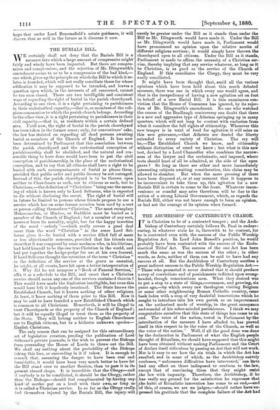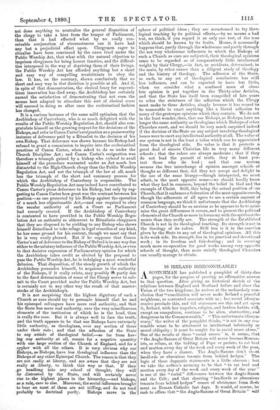THE ARCHBISHOP OF CANTERBURY'S CHARGE.
IT is Christian to be of a contented temper ; and the Arch- '. bishop of Canterbury certainly follows St. Paul in endeav- ouring, in whatever state he is, therewith to be content, for he is contented even with the success of the Public Worship Regulation Act. In Lord John Russell's position, he would probably have been contented with the success of the &de- siastical Titles' Act. The success of the one Act has been much the same as was the success of the other ; in other words, as Acts, neither of them can be said to have had any success at all. But the Archbishop of Canterbury ascribes a great indirect success to the Public Worship Regulation Act:- ." Those who promoted it never desired that it should produce a crop of convictions and of punishments inflicted upon wrong- headed, though conscientious men. What they desired was to put a stop to a state of things,—common, and growingsnix years ago,—by which every raw theologian visiting Belgium or some other neighbouring Roman Catholic country, came back laden with a crop of very doubtful innovations which he sought to introduce into his own parish as an improvement on the authorised mode of worship, to the great annoyance and scandal of his sober-minded parishioners. I think we may congratulate ourselves that this state of things has come tonn end. The voice of the nation, tested in Parliament brthe ,introduction of the measure I have alluded to, has proved ,itself in this respect to be the voice of the Church, as 'well as the voice of the nation." Well, if all the good done was-done by the declaration in Parliament of what the English,psople thought of Ritualism, we should have supposed that this might have been obtained without making Parliament and the Court of Arches itself ridiculous by passing an Act that will not work. Nor is it easy to see how the six trials in which the Act has ;resulted, and in some of which, as -the Archbishop, nicely confesses, " unforeseen difficulties have intervened," (mailer:, had any effect on those indisposed to conform to the-law, except that of convincing them- that they might. resist the law with impunity. Therefore; the Archbishop, if he has really any ground for the satisfaction he expresses that „the habit of Ritualistic innovation has come to an end,--and 'of this, of coarse, we are no judges,—should rather have ex- pressed his gratitude that the complete failure of the-Asehad not done anything to neutralise the general disposition of the clergy to take a hint from the temper of Parliament, than that it had effected what by no easily con- ceivable conjunction of circumstances can it have had any but a prejudicial effect upon. Clergymen eager to ritualise have been convinced by the cases tried under the Public Worship Act, that what with the natural objection to imprison clergymen for being honest fanatics, and the difficul- ties interposed in the way of depriving them of their livings, the Public Worship Act has afforded anything but a short and easy way of compelling recalcitrants to obey the law. It has, on the contrary, shown conclusively that no short and easy way in that direction is possible at all. And if, in spite of that demonstration, the clerical fancy for supersti- tious innovation has died away, the Archbishop has certainly earned the satisfaction of demonstrating that not even the means beat adapted to stimulate this sort of clerical craze will succeed in doing so after once the ecclesiastical fashion has changed. It is a curious instance of the same mild optimism that the Archbishop of Canterbury, who is so much delighted with the results of the Public Worship Regulation Act, should also con- gratulate himself on the growing respect for the decisions of the Bishops, and refer to Canon Carter's resignation as a praiseworthy instance of deference paid by a Ritualist to the decision of his own Bishop. That deference was shown because his Bishop had refused to grant a commission to inquire into the ecclesiastical practices of Canon Carter, when asked to do so under the Church Discipline Act ; and Canon Carter's resignation was therefore a triumph gained by a bishop who refused to avail himself of the procedure warranted under an Act much less distasteful to the High-Church clergy than the Public Worship Regulation Act, and not the triumph of the law at all, much less the triumph of the short and summary process for which the Archbishop of Canterbury is responsible. The Public Worship Regulation Act may indeed have contributed to Canon Carter's pious deference to his Bishop, but only by sug- gesting to Canon Carter how great was the contrast between his position—as one protected by his Bishop against the operation of a much less objectionable Act,—and one required to obey the secular authority of such a Court as Parliament had recently created. If the Archbishop of Canterbury is contented to have provided in the Public Worship Regu- lation Act an authority so abhorrent to Ritualistic clergymen that they are disposed to be yielding to any Bishop who shows himself disinclined to take refuge in legal remedies of any kind, he has some ground for his content, though we must say that he is very easily pleased. But if he supposes that Canon Carter's act of deference to the Bishop of Oxford is in any way due either to the salutary influence of the Public Worship Act, or even to that decisive expression of Parliamentary opinion for which the Archbishop takes credit as elicited by the proposal to pass the Public Worship Act, he is indulging a most wonderful delusion. That disposition, of the steady growth of which the Archbishop persuades himself, to acquiesce in the authority of the Bishops, if it really exists, may possibly partly due to the fixed determination of some of the Clergy never to sub- mit to the Court provided under the Public Worship Act, but is certainly not in any other way the result of that master-. stroke of the Archbishop's.
It is not surprising that the highest dignitary of such a Church as ours should try to persuade himself that he and his episcopal colleagues have more real authority, and that the State has more real authority, over the very miscellaneous, elements of the institution of which he is the head, than is really the case. But it is always well to face the truth,; and the truth appears to be that our Bishops have extremely little authority, as theologians, over any section of those under their rule ; and that the adhesion of the State. to any article of theological belief,—so far from hav-1 ing any authority at all, counts for a negative quantity! with one large section of the Church of England, and for al cypher with all the others. It is very obvious why our! Bishops, as Bishops, have less theological influence than their Bishops of any other Episcopal Church. The reason is that they are not really at liberty, and are aware that they are not really at liberty, to think this way or that. If they! go headlong into any school of thought, they will be distrusted by the State, and will certainly never' rise to -the highest places in the hierarchy,—and bishops,f as a rale,:care to rise. Moreover, the social influences brought; to bear •en most of them are not trifling, and do not tend: probably -to doctrinal purity. Bishops move in the" sphere of political ideas ; they are accustomed to try theo- logical teaching by its political effects,—by no means a bad test, we think, if you regard it as only one test, of the tree which should be known by its fruits. Hence, it necessarily happens that, partly through the wholesome and partly through the not very wholesome influences to which the Bishops of such a Church as ours are subjected, their theological opinions come to be regarded as of comparatively little intellectual weight by their Clergy,—in fact, as accidents, determined, in the main, by other causes than a diligent study of theology and the history of theology. The adhesion of the State, as such, to any set of theological conclusions has still less influence, and can be expected to have but little, when we consider what a confused mass of obso- lete opinion is put together in the Thirty-nine Articles, and that the State has itself been compelled of late years to relax the strictness of the adhesion which the Clergy must make to these Articles, simply because it has ceased to be reasonable to exact anything like a literal adhesion to many of the grotesque opinions which they contain. We do not in the least wonder, then, that our Bishops, as Bishops, have no longer the same authority as theologians which Bishops of other Churches exert, and we should be very much surprised indeed if the decision of the State on any subject involving theological issues were to exert any intellectual authority at all. The value of our system is not in the least a value which can be appreciated from the theological side. Its value is that it protects a great deal of sincere Christian life in very many different schools ; that the rulers are always moderate ; that if they do not load the pursuit of truth, they at least pro- tect those who do lead ; and that our system secures the free interchange of opinion amongst schools of thought so different that, did they not accept and delight in the use of the same liturgy—though interpreted, we must admit, in the most opposite sense—we should hardly know what they had in common, beyond the belief in God and the example of Christ. Still, this being the actual position of our Church, that it embraces a federation of the most opposite creeds, though the adherents of all agree to use a certain amount of common language, we think it unfortunate that the Archbishop of Canterbury should be so anxious as he appears to be to mini- mise the great differences it covers, and to present the political elements of the Church as more in harmony with the spiritual ele- ments than they really are. The strength of the Established Church is not in its theological teaching. Its strength is not in
the theology of its rulers. Still less is it in the sanction given by the State to any set of theological opinions. All this is its weak side. Its strength lies in its practical and devotional work ; in its freedom and fair-dealing ; and in securing much more co-operation for good works among very opposite schools of thought, than more strictly theological Churches can usually manage to obtain.



































 Previous page
Previous page